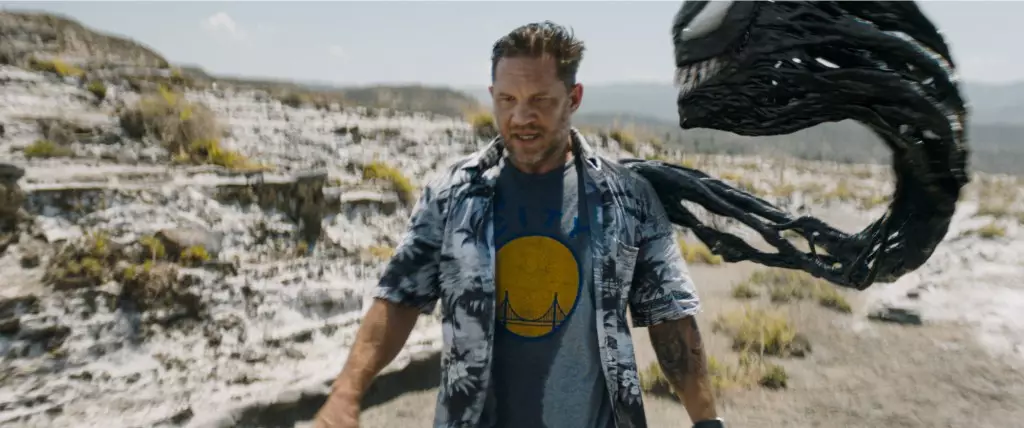In the latest installment of the Venom franchise, “Venom: The Last Dance,” audiences are once again greeted with the peculiar experience of British actors portraying American roles. Leading the way is Tom Hardy, reprising his role as Eddie Brock, the flawed journalist grappling with the burdens of his symbiotic companion, Venom. However, the supporting cast, featuring the likes of Chiwetel Ejiofor, Juno Temple, and Rhys Ifans, brings their own flair to a familiar narrative. The British touch adds a unique flavor to the American superhero landscape while raising questions about authenticity and representation in Hollywood. Despite its strong cast, “The Last Dance” exhibits a troubling reliance on the tropes established by its predecessors, making it difficult to escape the shadow of previous Marvel offerings.
The film wastes no time immersing viewers in a convoluted storyline, which begins in a dark and foreboding prison planet, home to Knull—a character recently elevated from the outskirts of the Marvel Cinematic Universe (MCU) to a central antagonist. Portrayed by Andy Serkis, Knull’s grandiose proclamations about his power feel nearly farcical amidst a backdrop that possesses little emotional heft. His quest involves seeking a codex capable of obliterating the universe, a trope that feels overly familiar within the superhero genre and lacks the dynamic storytelling needed to engage audiences fully.
Eddie Brock’s predicament, depicted through a series of often humorous scenarios, hints at character development but doesn’t seem to earnestly explore the depths of Brock’s psyche. As the film jolts between scenes in Mexico and Nevada, it introduces a decidedly absurdist aspect to its narrative, showcasing Venom’s comedic misadventures and Brock’s frantic attempts to clear his name following allegations of murder. However, one must question whether this comedic relief serves to elevate the material or simply distracts from a lack of coherence.
“Venom: The Last Dance” struggles to carve a distinct identity amid a saturated market of superhero films. While it aims to capture the irreverent spirit that characterized the original “Venom,” the film ultimately relies on familiar tropes rather than establishing a fresh perspective. The narrative’s core—a cosmic battle for control over a formidable power source—echoes countless other adventures, feeling less like a unique chapter in the Venom saga and more like a regurgitation of industry conventions.
The introduction of Dr. Payne, played by Juno Temple, highlights yet another predictable character arc fueled by past trauma and obsession with extraterrestrial life. This subplot, while somewhat resonant, unfolds in a formulaic manner that undermines its potential impact. The tensions between the military and scientific interests surrounding alien life forms underscore a theme of sacrifice but feel heavily weighted down by clichéd dialogue and predictable plot trajectories, ultimately failing to resonate with depth.
Director Kelly Marcel, in her attempt to maintain momentum, delivers an action sequence that aims for clarity amidst the chaos. The film’s climactic moments contain an emotional undercurrent aligned with personal stakes, reminiscent of Ang Lee’s contemplative approach in “Hulk.” Yet, even as the battle unfolds between the multifaceted foes—humans, symbiotes, and the grotesque xenophage—audiences can’t help but feel a sense of detachment from the overall narrative due to its overreliance on CGI and established superhero tropes.
One particularly jarring moment involves a comedic interlude featuring Venom dancing to ABBA, which shatters any ominous tension that had built up until that point. This moment exemplifies the film’s struggle between tone and thematic seriousness, raising the question of whether such ludicrous antics serve to heighten the characters or merely distract from an otherwise doomsday scenario.
Although “Venom: The Last Dance” doesn’t achieve the heights of masterful storytelling, it isn’t entirely devoid of merit. The film brings a level of humor that may resonate with certain audiences while assuring the die-hard fans of the franchise continue to follow the adventures of Eddie Brock and his otherworldly companion. However, it becomes evident that the film’s overarching themes may often be overshadowed by conventional storytelling metrics typically associated with superhero films.
As the film nudges toward a potential conclusion, viewers are left pondering whether this will be the end of Eddie Brock’s journey or merely a detour leading to further explorations within the franchise. Ultimately, “Venom: The Last Dance” serves as a potent reminder that even the most capable casts and ambitious premises can falter when weighed down by the expectations of a well-traveled franchise model. Indeed, one must question how far the superhero genre can stretch before the purely formulaic practices stifle innovation and creativity.

Leave a Reply